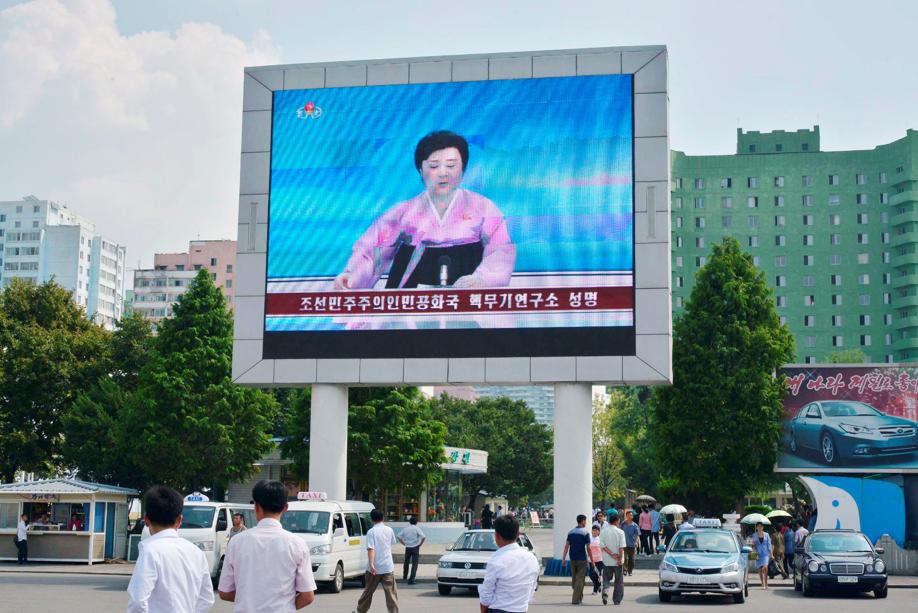
NEW YORK — Is North Korea irrational? Or does it just pretend to be?
North Korea has given the world ample reason to ask: threats of war, occasional small-scale attacks against South Korea, eccentric leaders, and wild-eyed propaganda. As its nuclear and missile programs have grown — this past week with a fifth nuclear test — that concern has grown more urgent.
But political scientists have repeatedly investigated this question and, time and again, emerged with the same answer: North Korea’s behavior, far from crazy, is all too rational.
Its belligerence, they conclude, appears to be calculated to maintain a weak, isolated government that would otherwise succumb to the forces of history. Its provocations introduce tremendous danger but stave off what Pyongyang, the country’s capital, sees as the greater threats of invasion or collapse.
Denny Roy, a political scientist, wrote in a still-cited 1994 journal article that the country’s “reputation as a ‘crazy state’’’ and for “reckless violence’’ had “worked to North Korea’s advantage,’’ keeping more powerful enemies at bay. But this image, he concluded, was “largely a product of misunderstanding and propaganda.’’
In some ways, this is more dangerous than irrationality. While the country does not want war, its calculus leads it to cultivate a permanent risk of one — and prepare to stave off defeat, should war happen, potentially with nuclear weapons. That is a subtler danger, but a grave one.
When political scientists call a state rational, they are not saying its leaders always make the best or most moral choices, or that those leaders are paragons of mental fitness. Rather, they are saying the state behaves according to its perceived self-interests, first of which is self-preservation.
When a state is rational, it will not always succeed in acting in its best interests, or in balancing short-term against long-term gains, but it will try. This lets the world shape a state’s incentives, steering it in the desired direction.
States are irrational when they do not follow self-interest.
In the “strong’’ form of irrationality, leaders are so deranged that they are incapable of judging their own interests. In the “soft’’ version, domestic factors — such as ideological zeal or internal power struggles — distort incentives, making states behave in ways that are counterproductive but at least predictable.
North Korea’s actions abroad and at home, while abhorrent, appear well within its rational self-interest, according to a 2003 study by David C. Kang, a political scientist now at the University of Southern California. At home and abroad, he found, North Korean leaders shrewdly determined their interests and acted on them. (In an e-mail, he said his conclusions still applied.)
“All the evidence points to their ability to make sophisticated decisions and to manage palace, domestic, and international politics with extreme precision,’’ Kang wrote. “It is not possible to argue these were irrational leaders, unable to make means-ends calculations.’’
North Korea’s seemingly unhinged behavior begins with the country’s attempt to solve two problems that it took on with the end of the Cold War and that it should have been unable to solve.
One was military. The Korean Peninsula, still in a formal state of war, had gone from a Soviet-American deadlock to an overwhelming tilt in the South’s favor.
The North was exposed, protected only by a China that was more focused on improving ties with the West.
The other problem was political. Both Koreas claimed to represent all Koreans, and for decades had enjoyed similar development levels. By the 1990s, the South was exponentially freer and more prosperous. The Pyongyang government had little reason to exist.
The leadership solved both problems with something called the Songun, or “military-first,’’ policy. It put the country on a permanent war footing, justifying the state’s poverty as necessary to maintain its massive military, justifying its oppression as rooting out internal traitors, and propping up its legitimacy with the rally-around-the-flag nationalism that often comes during wartime.
From afar, North Korea’s actions look crazy. Its domestic propaganda describes a reality that does not exist, and it appears bent on almost provoking a war it would certainly lose.
But from within North Korea, these actions make sense. And over time, the government’s reputation for irrationality has become an asset as well.
Roy, in an interview, said North Korea “intentionally employs a posture of seemingly hyper-risk acceptance and willingness to go to war as a means of trying to intimidate its adversaries.’’
But this strategy works only because, even if the belligerence is for show, the danger it creates is very real.
Weak states that face more powerful foes must either make peace — which North Korea cannot do without sacrificing political legitimacy — or find a way to survive any conflict.
North Korea’s nuclear program, some analysts believe, is designed to halt a US invasion by first striking nearby US military bases and South Korean ports, then by threatening a missile launch against the US mainland. While North Korea does not yet have this ability, analysts believe it will within the next decade.
The culmination of North Korea’s rationality is desperation theory: When states face two terrible choices, they will pick the least bad option.


 PREVIOUS ARTICLE
PREVIOUS ARTICLE